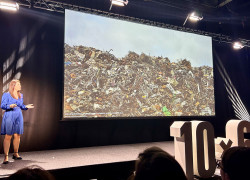Research highlights lack of political and financial support to reach urban sustainability targets across Europe
A thinkstep AG and Drees & Sommer study into delivering sustainability targets in European cities has found that a lack of political support and financial resources are among the biggest barriers.
Bridging the Climate Gap focused on the municipal building sector in 15 European cities including Glasgow, Helsinki, Munich and the Swedish city of Va?xjo?. It looked at their current strategies to meet targets set out in the Paris Agreement on Climate Change to assess the challenges and highlight good practices.
While all cities claimed to be affected by the consequences of global warming, more than 60% lacked the greater political support necessary to deliver on sustainability targets aimed at keeping temperature increases below 1.5°C, as recommended by the Intergovernmental Panel on Climate Change.
Based on a mixture of interviews, surveys and empirical data, 70% also said they lacked the financial resources to set more ambitious climate targets and 40% believed there wasn’t an appropriate administrative structure for multi-disciplinary climate protection measures.
Two thirds also said there were too few people with the right technical skills and expertise with lack of education, guidance and training seen as a barrier.
However, Va?xjo?, an award-winning city, was held up as an example of how the early and broad-based introduction of strategies to reduce greenhouse gasses can lead to economic growth and prosperity.
The report’s authors Martin Blumberg, VP Sustainable Building & Construction at thinkstep AG and Gregor Grassl, Team Leader Integrated Urban Solutions at Drees & Sommer, set out measures to help cities deliver on their sustainability targets. These include the development of recyclable buildings, mobility strategies and alternative methods of funding.
Gregor Grassl said: “The findings make it clear that we need more courage and comprehensive expertise to decarbonize our society and industry. In the search for solutions, we should also consider that there are external factors for municipalities they cannot influence, for example, changes in the energy mix. Governments have to, therefore, introduce legislative change in order to transform their systems and to encourage and facilitate emissions reductions.”
Martin Blumberg said: “When looking at the example of Va?xjo?, it is vital to recognize they have succeeded in encouraging the different stakeholders such as municipal organizations, citizens and companies to support the ambitions. Building strategical alliances and collaborating on many levels is a critical factor for municipalities for reaching their goals.”
Communiqués liés
Changement de génération à la tête de Drees & Sommer Lux...
Drees & Sommer Luxembourg, entreprise leader du conseil et du management de proj...
Drees & Sommer Ergebnis 2023: Entwicklung weiter positiv
Trotz eines schwierigen geopolitischen wie wirtschaftlichen Umfelds behielt die ...
Drees & Sommer lauréat du Vision Zero Award
Drees & Sommer, société leader dans le conseil et la réalisation de projets d...
Drees & Sommer chez 10x6 : Aperçu de la vision du New Europ...
Drees & Sommer Luxembourg a le plaisir d'annoncer sa participation à l'événem...
Dynamiser le cycle des matières : EPEA présente la premiè...
Selon les prévisions de la Banque Mondiale, près de quatre milliards de tonnes...
Drees & Sommer publishes new sustainability report
Drees & Sommer has published its new sustainability report, which shows the step...
Il n'y a aucun résultat pour votre recherche







